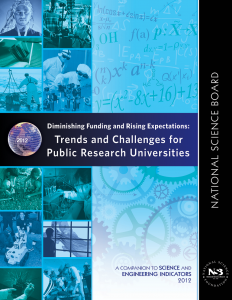Related Posts
Three big issues
 1. Budget pain lingers: A new report from the National Science Board painted a grim picture of budget cuts public universities have taken over the last several years. While we at UNC-Chapel Hill and the UNC system have felt (and feel) the pain, many states have fared much worse. The pain could be compounded for all of us everywhere in the U.S. if budget sequestration occurs as I wrote last week (http://mondaymorning.web.unc.edu/2012/09/21/the-s-word/). Some people have asked if we are still a public university. We are, and we are very grateful to the people of North Carolina for the support they give us. While it’s below where we were in 2008, we could not serve our students without that support.
1. Budget pain lingers: A new report from the National Science Board painted a grim picture of budget cuts public universities have taken over the last several years. While we at UNC-Chapel Hill and the UNC system have felt (and feel) the pain, many states have fared much worse. The pain could be compounded for all of us everywhere in the U.S. if budget sequestration occurs as I wrote last week (http://mondaymorning.web.unc.edu/2012/09/21/the-s-word/). Some people have asked if we are still a public university. We are, and we are very grateful to the people of North Carolina for the support they give us. While it’s below where we were in 2008, we could not serve our students without that support.
2. Leadership transitions occur faster: University leadership turns over faster than it used to, even several years ago. (Hunter Rawlings, president of the Association of American Universities (AAU) and former president of Cornell University and University of Iowa, spoke eloquently about the issues during a recent talk at UNC Chapel Hill. Since March 2011, 13 presidents of 35 public universities in the AAU have stepped down before the end of their terms. Turnover is higher in public universities compared to private. The prospects for even more turnover in the next few years are strong if trends documented in a recent report by the American Council on Education hold.
3. The job keeps getting tougher: Our Chancellor, Holden Thorp, is among the growing group of presidents/chancellors who have or will step down before the end of their terms. Leadership changes are expensive in time and money. As Rawlings said, budget cuts, athletics scandals, adversarial relationships with legislatures, idealogical issues and corporatization of universities have made the president’s (chancellor’s) job much more difficult, visible and subject to controversy. When someone as smart and committed as Holden Thorp leaves his post early, we all lose the vision, intellect, imagination and energy he brings to his position.
I heard a discussion last week on NPR about how difficult it is to be president of the U.S.: a 24/7 job, constant criticism, perpetual fundraising and success depends on a lot of other people and situations over which one has little control. It sounds a lot like the university leader’s job.
Half the Sky, Nicholas Kristof and Sheryl WuDunn’s book, is now a special documentary to be aired on PBS stations tonight and tomorrow night—a very important event. Anyone interested in the lives of women should watch the show.
Happy Monday. Barbara

